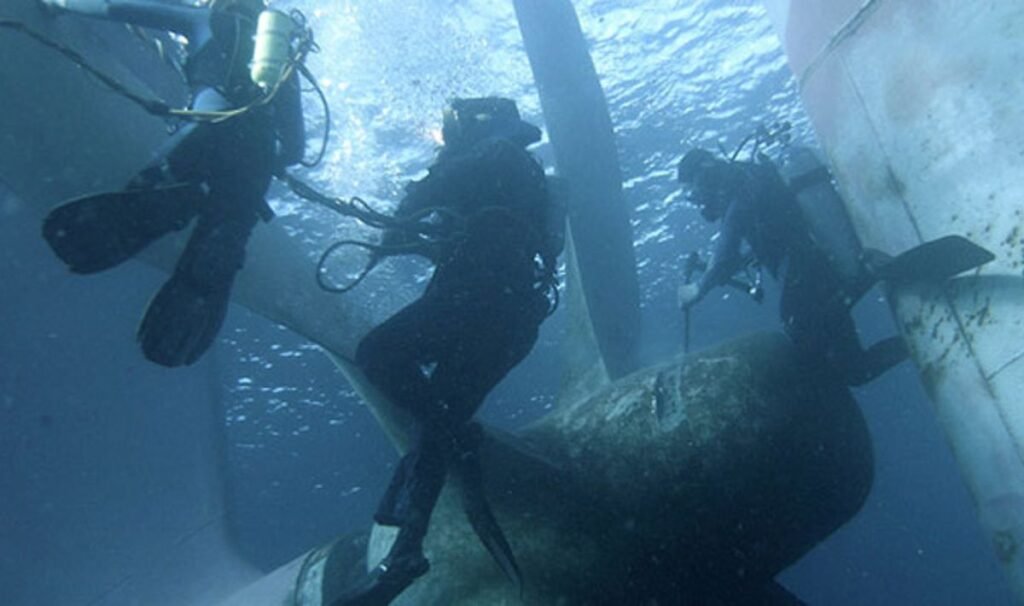If you operate a vessel in Tunisia, you know that underwater hull cleaning is a crucial part of your maintenance routine. Beneath the waterline, your ship’s hull faces a constant battle against marine growth—algae, barnacles, and other organisms that can quickly turn a smooth surface into a drag-inducing mess. In this guide, we’ll explore everything you need to know about underwater hull cleaning in SSfax, from the methods used to the benefits for your vessel and the environment.
Introduction to Underwater Hull Cleaning in Sfax
Imagine your vessel as a marathon runner—streamlined and powerful above the surface, but below, burdened by marine growth that clings like ankle weights. This hidden drag, known as biofouling, reduces speed, increases fuel consumption, and strains your budget. That’s why underwater hull cleaning in Sfax isn’t just routine upkeep—it’s a critical practice for maintaining top performance, fuel efficiency, and long-term operational reliability. In a competitive maritime environment, staying ahead starts beneath the waterline.
With the support of Tunisia’s National Port Authority and local marine service providers, regular hull cleaning in Sfax ensures vessels meet both performance and environmental standards while navigating one of North Africa’s busiest ports.

The Impact of Biofouling in Sfax Waters
The warm, nutrient-rich waters around Sfax create ideal conditions for rapid marine growth. Biofouling is the accumulation of algae, barnacles, and other sea life on the hull. This buildup increases drag, reduces speed, and forces your engines to work harder, leading to higher fuel consumption and increased emissions.
Fuel Efficiency and Operational Costs
Even a thin layer of slime can reduce your vessel’s efficiency by up to 10%. Heavier fouling can have an even greater impact, causing significant fuel wastage and higher operational costs. Regular underwater hull cleaning in Sfax is the most effective way to keep your ship gliding smoothly and your expenses under control.
Manual Diver Cleaning
Traditionally, professional divers equipped with brushes, scrapers, and sometimes high-pressure jets carry out underwater hull cleaning in Sfax. Divers can target both large flat areas and hard-to-reach niches, ensuring thorough removal of biofouling.
Robotic and Automated Systems
The industry is evolving. Robotic cleaning systems and remotely operated vehicles (ROVs) are now available in some ports, offering efficient, diver-free hull cleaning. These machines use rotating brushes, suction, and even onboard filtration to remove and capture marine growth, minimizing environmental impact.
High-Pressure Water Jetting
High-pressure water jets are a popular and effective method for underwater hull cleaning in Sfax. When used correctly, they remove biofouling with minimal risk to the hull’s protective coating. Some advanced systems, like HullWiper, even collect debris as they clean, preventing the spread of invasive species and pollution.
Pre-Cleaning Inspection
Before any cleaning begins, a thorough inspection is performed. Divers or ROVs assess the extent of fouling, check for hull damage, and plan the safest, most effective approach for underwater hull cleaning in Sfax.
Cleaning Operations
Depending on the method, trained divers or advanced robotic systems methodically remove marine growth from the hull, restoring optimal vessel performance. Tools used range from hand-held brushes to high-powered water jets, each selected based on the type and extent of fouling. Throughout the process, care is taken to avoid damaging antifouling coatings, hull integrity, or sensitive components such as sensors and intake grids.
Professional cleaning services follow best practices to ensure both safety and environmental compliance, often aligning their methods with international standards set by the International Maritime Organization (IMO). This ensures that cleaning operations are both effective and environmentally responsible.
Post-Cleaning Review and Reporting
After cleaning, another inspection ensures all fouling has been removed and the hull is in good condition. Many providers offer detailed reports, including before-and-after photos and recommendations for future maintenance.
Eco-Friendly Cleaning Solutions
Modern underwater hull cleaning in Sfax emphasizes environmental responsibility. Some systems filter and capture debris and metals, preventing them from re-entering the sea and protecting local marine life.
Compliance with Local and International Standards
Professional providers in Sfax follow strict regulations to ensure that cleaning operations do not harm the environment or violate port rules. Always choose a service that complies with both Tunisian and international standards.
What to Look for in a Provider
- Certified, experienced divers or advanced robotic systems
- Eco-friendly, non-damaging cleaning techniques
- Transparent inspection and reporting
- Compliance with local and international regulations
Questions to Ask Before Booking
- What cleaning methods do you use for underwater hull cleaning in Sfax?
- How do you ensure no damage to antifouling coatings?
- Can you provide a detailed inspection and cleaning report?
- Do you comply with local port and environmental regulations?

Benefits of Regular Underwater Hull Cleaning in Sfax
Performance, Longevity, and Sustainability
Routine underwater hull cleaning in Sfax keeps your vessel running at peak performance, lowers fuel costs, and extends the life of your hull coatings. It’s also a commitment to environmental stewardship, helping to prevent the spread of invasive species and reduce pollution.
Conclusion: Keeping Your Vessel Efficient in Sfax
Underwater hull cleaning in Sfax is more than just a maintenance task—it’s a smart investment in your vessel’s future. By choosing professional, eco-friendly services, you ensure your ship remains efficient, compliant, and ready to face the challenges of the Mediterranean. Don’t let marine growth slow you down—make underwater hull cleaning a regular part of your maintenance strategy.
FAQ:
Q1. How often should I schedule underwater hull cleaning?
Most vessels benefit from cleaning every 3–6 months, but local conditions and vessel usage may require more frequent attention.
Q2. Can underwater hull cleaning in services be performed while the vessel is at berth?
Yes, many providers can clean your hull at berth or anchor, minimizing downtime and keeping your schedule on track.
Q3. Are there eco-friendly options for underwater hull cleaning?
Absolutely. Many providers use systems that capture debris and filter water, ensuring minimal environmental impact.
Q4. Will underwater hull cleaning damage my antifouling paint?
Not when performed by certified professionals using the right equipment and techniques.
Q5. What are the signs my vessel needs underwater hull cleaning?
Look for increased fuel consumption, reduced speed, or visible marine growth at the waterline. Regular inspections are the best way to stay ahead.


